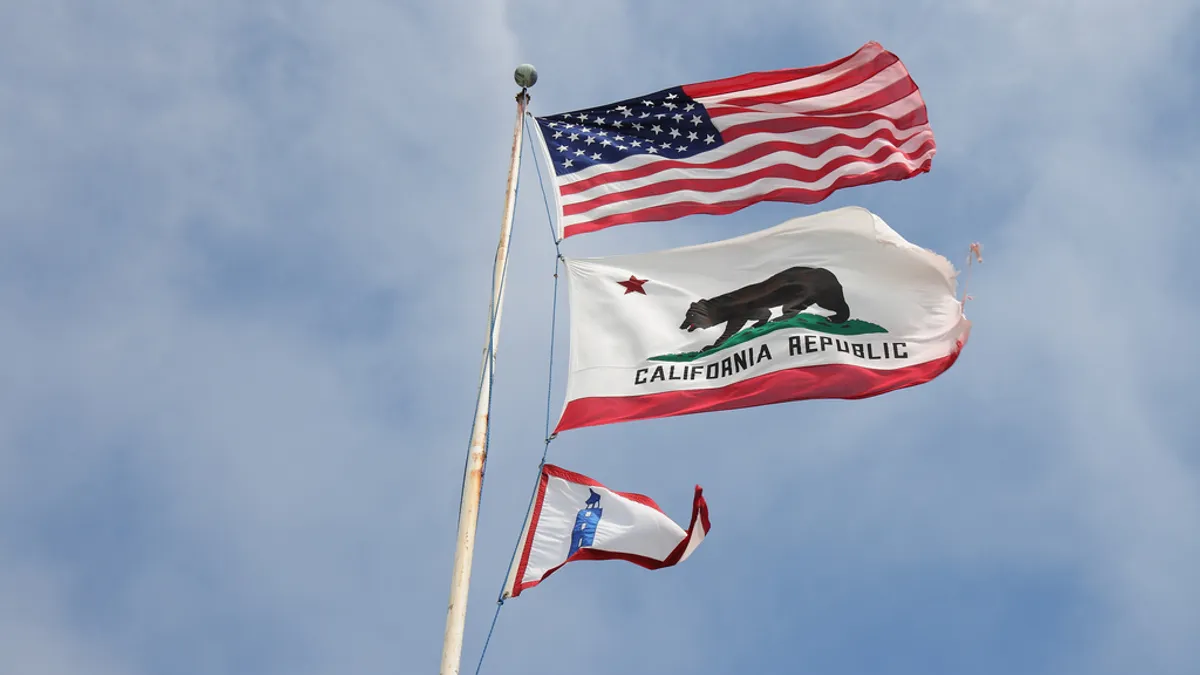Dive Brief:
- A new partnership between the state of California and eight public and private universities there aims to help students fund their education, earn academic credit and gain work experience in public service fields, according to an announcement this week.
- The Civic Action Fellowship, which was described as a pilot program, will be available to undergraduate and graduate students through AmeriCorps beginning next fall and financed through $3.2 million in state and federal funding.
- About 250 students are expected in the first cohort. They will work with local nonprofit and government agencies, though their experiences will vary based on how their institutions implement the program.
Dive Insight:
The initiative reflects the growing interest in work-based learning, and its participants are promoting it as an example of how states and institutions can work together to solve local and regional problems while drawing more students into public service.
It is modeled after a similar offering at one of the participating institutions, Dominican University of California. Through its Reimagining Citizenship initiative, the private university gives undergraduates hailing from nearby Novato, California, up to $100,000 over four years toward their education in exchange for working as summer interns for the city.
"It's a really good example of a program that's grown organically, and so there are a lot of things, including the positive impact on students, that's really encouraged us to take (it) to the state level," Mary Marcy, president of Dominican, told Education Dive in an interview.
Unlike with Dominican's existing program, however, students participating in the new program there and statewide will complete their civic engagement work during the academic year.
"In the summer, a lot of our students, like many students around the country, they need to work to make enough money to help support their way to and through college," she said. "We wanted this to not be a choice for them."
Marcy expects about 35 students will participate in Dominican's adaptation of the Civic Action Fellowship. They will work 450 hours over the course of a semester. Upon completion, they will be eligible to receive a $1,612 scholarship through AmeriCorps. Incoming students accepted into the program through Dominican will also get up to $25,000 annually in scholarship money over four years. They must be California residents to participate.
Coursework will help reinforce their experiences. The semester prior, Dominican students will take a class that teaches the concepts underlying civic engagement and service learning. During their semester of work, they'll take a similar class with their cohort.
"Even though their civic engagement work may be with different nonprofits or different government agencies, that academic and pedagogical piece will be common for all of them," Marcy said.
Other participating institutions include the University of California campuses in Berkeley and Merced as well as California Lutheran University. Each will work with local nonprofits and public agencies to integrate the service-learning component into students' degree pathways while ensuring it is feasible for them to graduate in four years.
At Berkeley, for instance, participants will work for 11 months in farming and forest communities on agriculture and climate issues, the student newspaper reported. Participants will receive $10,000 through the new fellowship and a $20,000 stipend from the university.
The initiative is part of Califoria Gov. Gavin Newsom's pitch to add 10,000 AmeriCorps service members, a representative from California Volunteers, a state agency focused on increasing service work, told Education Dive in an email.
An intermediary entity, such as AmeriCorps, is necessary for a program like the Civic Action Fellowship to work because it has the infrastructure to implement work-based learning, said Ana Gutierrez, senior director at Jobs For the Future (JFF).
"The coordination and integration will be the biggest challenge that this ... pilot will face as they work through the logistics of operationalizing the concept," she said.
Students will work between 300 and 1,700 hours over the course of a semester or year, depending on how their school structures the program, according to California Volunteers. Students can earn up to $10,000 through the fellowship, and some schools are providing additional funding.
The financial aid component, Gutierrez added, is "very much the state modeling what these types of experiences should look like."
Public and private institutions nationwide are looking harder at how to incorporate experiential learning into their curriculum. In some cases, that has led them to embed industry-recognized credentials and offer internships and other training opportunities earlier in a student's academic experience.
At liberal arts colleges like Dominican, the imperative has spurred curriculum overhauls that include hands-on learning designed to show students how their coursework lines up with the skills they'll be expected to have in the workplace.
JFF's Gutierrez expects California's new initiative will help push higher education institutions, particularly four-year colleges, to "reimagine" their role in their communities as technology and employers' expectations change the nature of many jobs.
Colleges' role must change, she said, "not because of a service-learning investment but because these internships and this application of what you're doing in the classroom is now mandated by the labor market."









